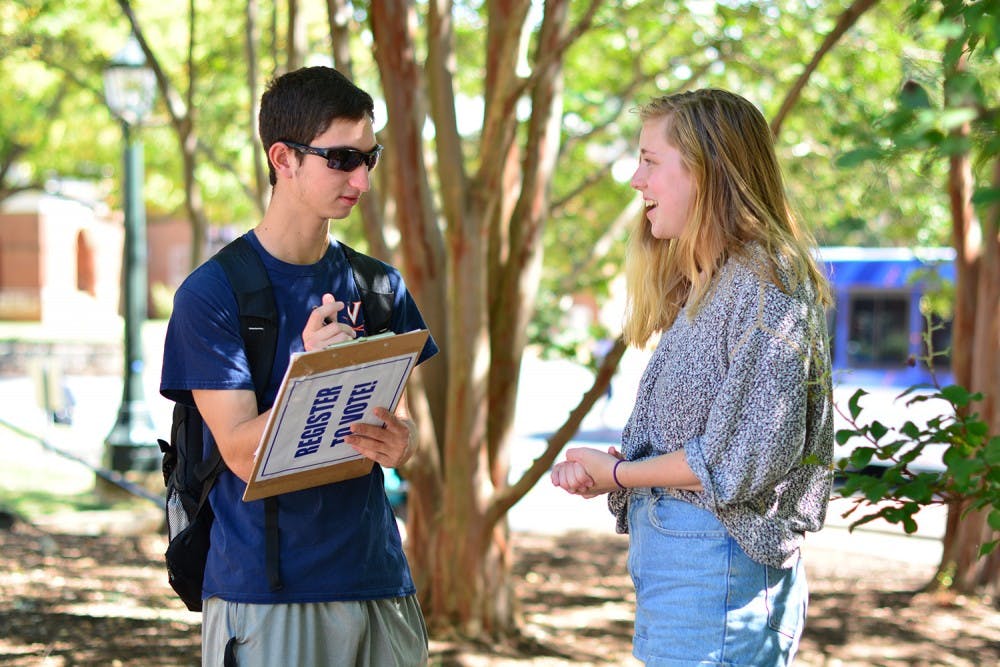Political organizations University Democrats and College Republicans endorsed a bill advocating for ranked choice voting — where voters rank candidates by order of preference — in local elections statewide. Two pieces of legislation in favor of ranked choice voting, HB553 and HB932, have been introduced in the Virginia General Assembly. HB553 was tabled Friday and HB932 will be voted on Monday.
Ranked choice voting, commonly referred to as RCV, allows voters to rank candidates in the order of their choice. Once ballots are cast, votes are counted up in sequential rounds where candidates who accumulated the least amount of votes are eliminated. Votes are counted in this manner and the candidate with the most votes in the final round is elected.
Sally Hudson, an assistant professor of public policy, education and economics at the Batten School, said she considers ranked choice voting beneficial as it allows for a more competitive race between candidates.
“It’s a way of ensuring that even if lots of candidates run for a seat, the eventual winner emerges with the majority support,” Hudson said.
Opponents to ranked choice voting have raised concerns about how the method hasn't been used extensively in the United States and that there is a risk of ballot exhaustion. Ballot exhaustion occurs when voters rank too few candidates and the candidates they select are eliminated before the final round of counting takes place to determine the winner.
HB553 was introduced by Del. Nicholas Freitas (R-Culpeper) and called for ranked choice voting in local races in cities and counties. Members of the General Government and Capital Outlay subcommittee of the House Appropriations Committee voted to table the bill Friday by a 8-0 vote.
Del. Patrick Hope (D-Arlington) proposed HB932 which would allow counties with a county manager plan of government — a system where an elected council or governing body appoints a city manager to oversee the day-to-day operations of the locality as its chief executive office — the option of implementing ranked choice voting for candidates to the board of supervisors. The bill passed out of committee to be voted on by the House Monday.
While Charlottesville operates under a city manager form of government, HB932 would only impact Arlington County if passed.
According to Hudson, if HB932 gets approved by the House and Senate, Arlington would be the first county in Virginia to have the option to implement ranked choice voting in their local elections.
Hudson is one of the founders of FairVote Virginia, an organization that advocates for ranked choice voting in legislation. Earlier this year, the initiative for ranked choice voting was raised in a Student Council Advisory Board meeting. Hudson reached out to organizations such as University Democrats and College Republicans to seek their involvement in the push for ranked choice voting as well.
Adam Kimelman, a third-year College student and chair of College Republicans, explained how the efforts to support ranked choice voting has allowed College Republicans to collaborate with University Democrats, and work together to accomplish the same goal.
“Since it is ranked choice voting, it is not like a Republican or Democratic issue — it’s very bipartisan,” Kimelman said. “The worst thing that could happen about this issue is that it gets politicized, that one party starts to make it their issue, and that’s not really what it’s about.”
Mary Alice Kukoski, a second-year College student and president of the University Democrats, further commended the bipartisan push for ranked choice voting and said how it can benefit the electoral process.
“I believe the bi-partisan nature of the letter sends the message for the need for greater election reform,” Kukoski said. “In the future I would love to see more bipartisan efforts to expand electoral access to more individuals.”
According to Hudson, it was essential for all groups interested in this issue to become involved.
“That was a big thing from our perspective, that the U.Va. Student Council, the College Republicans and the University Democrats all issued a joint endorsement of the ranked choice voting legislation in Virginia this year,” Hudson said. “[It] is really special to see all of these students come together in this bipartisan show of support for a good government.”
The current system in Charlottesville uses the popular vote method, in which a person votes for one candidate and whoever gets the most votes wins. For University student elections, ranked choice voting is used. Hudson said she believes ranked choice voting appeals to the younger group of voters.
“I think young voters in particular are ready for a new brand of politics, that emphasizes substance … and ranked choice voting is designed to support just that,” Hudson said.
Hudson said multiple cities have seen improvements in their voting participation after implementing ranked choice voting.
“You start to see more people turning out because they feel like their vote really matters,” Hudson said. “You see campaigns that are more issue focused which is great for voters, and voters don’t have to worry about wasting their vote … while ensuring that they still get to weigh in on whatever the final head to head is between front-runners.”
Correction: The article previously misstated that bill HB553 called for ranked choice voting in statewide elections. Instead, it only covered local races in cities and in counties. Additionally, the article previously misstated that Arlington will be the first county to implement ranked choice voting in their local elections if the bill passes. Rather, Arlington would be the first county to have the opportunity to implement ranked choice voting.







